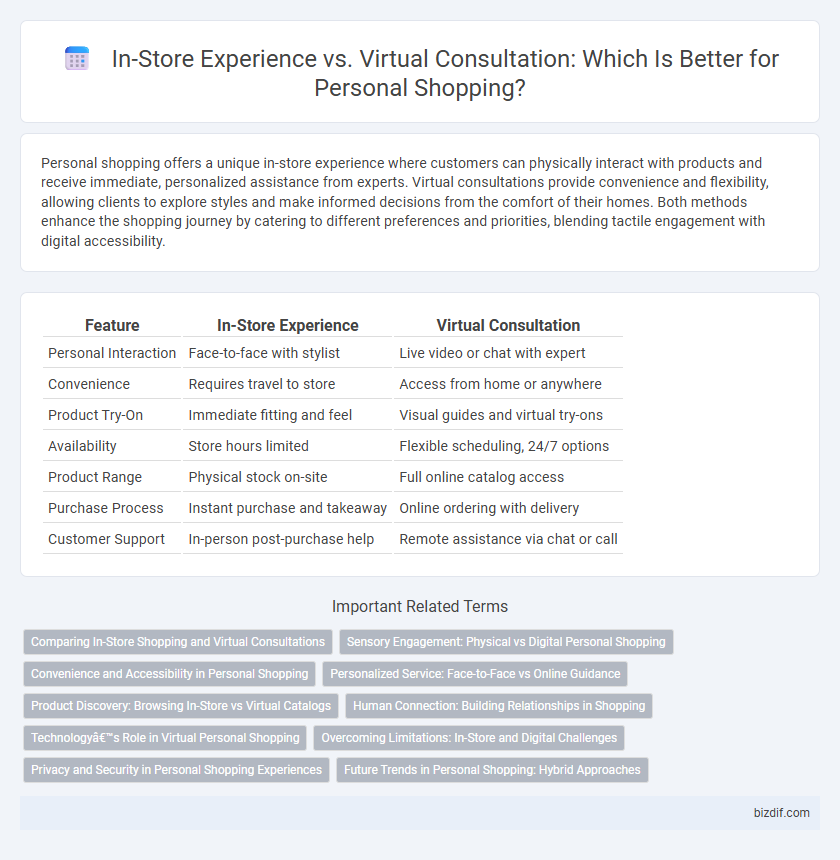Personal shopping offers a unique in-store experience where customers can physically interact with products and receive immediate, personalized assistance from experts. Virtual consultations provide convenience and flexibility, allowing clients to explore styles and make informed decisions from the comfort of their homes. Both methods enhance the shopping journey by catering to different preferences and priorities, blending tactile engagement with digital accessibility.
Table of Comparison
| Feature | In-Store Experience | Virtual Consultation |
|---|---|---|
| Personal Interaction | Face-to-face with stylist | Live video or chat with expert |
| Convenience | Requires travel to store | Access from home or anywhere |
| Product Try-On | Immediate fitting and feel | Visual guides and virtual try-ons |
| Availability | Store hours limited | Flexible scheduling, 24/7 options |
| Product Range | Physical stock on-site | Full online catalog access |
| Purchase Process | Instant purchase and takeaway | Online ordering with delivery |
| Customer Support | In-person post-purchase help | Remote assistance via chat or call |
Comparing In-Store Shopping and Virtual Consultations
In-store shopping provides a tactile experience, allowing customers to try products firsthand and receive immediate, personalized assistance from sales associates. Virtual consultations offer convenience and accessibility, utilizing video calls and digital tools to browse inventory and receive expert advice remotely. Both methods cater to different customer preferences, emphasizing either the sensory engagement of physical stores or the flexibility and safety of online interactions.
Sensory Engagement: Physical vs Digital Personal Shopping
Physical personal shopping offers rich sensory engagement through tactile interaction with products, enabling customers to feel fabrics, test scents, and observe true colors in real time. Virtual consultation relies on high-quality visuals and interactive technology but lacks the tangible sensory feedback provided by in-store experiences. Enhanced digital tools like augmented reality and 3D modeling aim to bridge this gap by simulating texture and fit, yet they cannot fully replicate the immersive physical sensations of traditional shopping.
Convenience and Accessibility in Personal Shopping
In-store personal shopping offers immediate product access and hands-on evaluation, enhancing convenience for those who prefer direct interaction and instant gratification. Virtual consultations provide unparalleled accessibility, enabling shoppers to connect with experts from any location at any time, ideal for busy schedules or remote customers. Both methods cater to different lifestyles, balancing physical engagement with digital flexibility to optimize the overall personal shopping experience.
Personalized Service: Face-to-Face vs Online Guidance
Personalized service in personal shopping delivers unique advantages in both in-store experiences and virtual consultations. Face-to-face interactions allow shoppers to receive immediate, tactile assistance and detailed product demonstrations from experts, enhancing decision-making through physical engagement. Online guidance offers convenience and access to digital tools, such as virtual try-ons and curated recommendations, providing tailored support without geographical constraints.
Product Discovery: Browsing In-Store vs Virtual Catalogs
In-store product discovery allows shoppers to physically engage with items, leading to tactile evaluation and spontaneous purchases influenced by real-time sensory input. Virtual consultations offer access to extensive digital catalogs with filtering options that streamline product selection based on preferences and specifications. While in-store browsing fosters immediate, immersive exploration, virtual catalogs provide convenience and expansive variety for personalized shopping decisions.
Human Connection: Building Relationships in Shopping
Human connection in personal shopping thrives through in-store experiences where sensory interaction and face-to-face communication establish trust and rapport. Virtual consultations leverage video calls and chat tools to maintain personalized engagement, offering convenience while fostering authentic relationships. Both methods prioritize understanding customer preferences, enhancing satisfaction through tailored recommendations and attentive support.
Technology’s Role in Virtual Personal Shopping
Virtual personal shopping leverages advanced technology such as augmented reality, AI-driven style recommendations, and real-time video consultations to deliver a highly personalized experience. These tools enable shoppers to visualize products in their own environment, receive expert advice instantly, and access curated selections without physical store visits. The integration of technology enhances convenience and customization, bridging the gap between traditional in-store services and digital interaction.
Overcoming Limitations: In-Store and Digital Challenges
Personal shopping faces unique challenges in both in-store and virtual consultations, such as limited product availability and lack of tactile experience in digital settings. Overcoming these limitations involves integrating real-time inventory tracking and augmented reality tools to enhance virtual try-ons and personalized recommendations. Efficiently blending physical and digital elements elevates customer satisfaction by providing convenience and a more immersive shopping experience.
Privacy and Security in Personal Shopping Experiences
In-store personal shopping provides a tangible environment where privacy is managed through controlled physical interactions and secure payment systems, minimizing digital data exposure. Virtual consultations emphasize encrypted communication platforms and strict data protection protocols to safeguard client information during remote sessions. Both experiences require robust privacy measures, but virtual shopping demands advanced cybersecurity strategies to prevent breaches in sensitive online interactions.
Future Trends in Personal Shopping: Hybrid Approaches
Hybrid approaches in personal shopping combine the tactile advantages of in-store experiences with the convenience of virtual consultations, enhancing customer satisfaction and engagement. Future trends indicate an increase in augmented reality (AR) and AI-powered tools that allow shoppers to visualize products virtually while enjoying personalized, face-to-face service. Retailers employing these hybrid models benefit from higher conversion rates and improved data-driven personalization.
In-Store Experience vs Virtual Consultation Infographic

 bizdif.com
bizdif.com